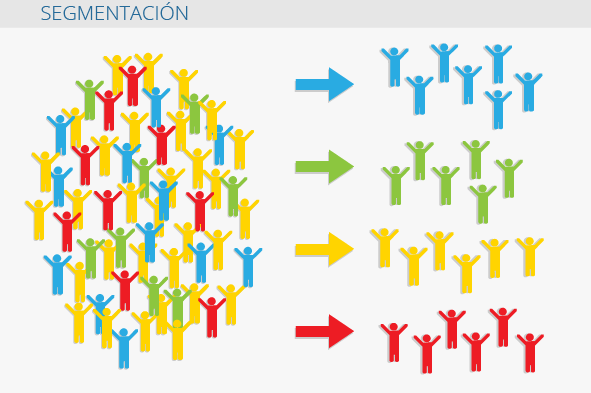"Segmentation" By definition it means decomposing a group into smaller fractions and it applies to different areas:
- In biology, an earthworm is made up of different segments
- In literature, words, phrases are divided into segments and minor units
- In IT, memory is also divided into many segments
- In economics, the term market segmentation is based on products and customers
Segmentation Criteria
Market segmentation
It is feasible to identify the potential customers of a company and divide the buyers into smaller segments by analyzing their behavior. With this analysis, segments of people are obtainedIn this case, based on behavior, behavior, tastes and expectations. These characteristics are similar within the same segment.
Different segments can be created based on characteristics such as:
- Demographic factors: age, gender, etc.
- Social: work, remuneration, hosting, etc.
- Psychological: personality, lifestyle, values, etc.
- Geographic: residence, domicile, etc.
- Behavioral: use of the media, price guidance, etc.
Customer segmentation
Some criteria for customer segmentation are, for example, sales and the extent of the business relationship with the customer.
There are different types of segments depending on the criteria that are most relevant for each company, sector, industry, etc.

Segment by age
The following segments have been established over time depending on the year of birth:
Postwar generation (1925 - 1945)
Those born during the Great Depression of the 1930s and during World War II. They consider savings and liquidity of great importance and are opposed to loans. Radio and newspaper lovers.
Baby boomers (1946 - 1964)
Born in the times of John F. Kennedy, Elvis, the Rolling Stones and the Beatles during the creation of advanced television, video and radio. They are generally brand loyal and more responsive in classic media.
Generation X (1965 - 1979)
Important events in his youth were the fall of the Berlin Wall and the explosion of the Challenger space shuttle. They are reported below and are receptive to direct commercial promotion.
Generation Y (1980 - 1994)
Development of the Internet, emails, SMS, videogames, consoles and DVDs. Their youth has seen movies like Titanic and celebrities like Britney Spears and Jennifer Lopez, and also disasters like September 11, 2001. They are generally less loyal to brands and manage to influence friends and family. Viral marketing and electronic media are the best for this segment.
Generation Z (1995 - present)
This latest generation is characterized by 3D movies, Smart TV, the Iran-Afghanistan conflict, the 2004 Asian tsunami, and WikiLeaks. They usually buy compulsively and spontaneously and prefer online stores. Interactive campaigns tend to be very successful in this segment.
Segment by lifestyles
Some examples are:
Lohas (Lifestyles of Health and Sustainability)
The You have they choose a lifestyle based on health and sustainability. They are interested in health, sustainability, organic food and outdoor vacations. They normally receive an above-average salary.
Lovos (Lifestyles of Voluntary Simplicity)
These people consciously make decisions according to a simple lifestyle and are against the exaggerated consumerism of modern times.
Dink (Double Income No Kids)
Couples who work full time and receive two full salaries but do not have children. They have an above-average salary, usually come from upper-middle-class families and are interested above all in business promotion.
Yuppies (Young Urban Professionals)
Yuppies are those who come from the cities and have a career orientation, they usually come from the upper middle class. They are generally in charge of management positions in large companies and have an optimistic and successful attitude. Thanks to their high pay, they can afford expensive houses and enjoy a high lifestyle.
Yollies (Young Old Leisure People)
Retired people with a youthful spirit who enjoy their pension. They usually have a pension that brings them moderate benefits.
Objectives of Segmentation
Through "market segmentation" companies can define their strategies in a more effective and simple way. "Customer segmentation" facilitates marketing campaigns so that ads generate greater impact on users because they offer what they are simply interested in - Targeting
Relevance for Online Marketing
Thanks to the Internet, it is currently feasible to target consumer segments with totally different characteristics. Different social networks are used to reach different “target audiences”. The younger segments tend to use the Internet the most, but there are pages and groups aimed especially at an older audience. From the point of view of the company, it is essential to review the segment you intend to target before launching an advertising campaign.
Web links
- Types of geographic targeting by country support.google.com
- Segment your ads to geographic locations support.google.com






